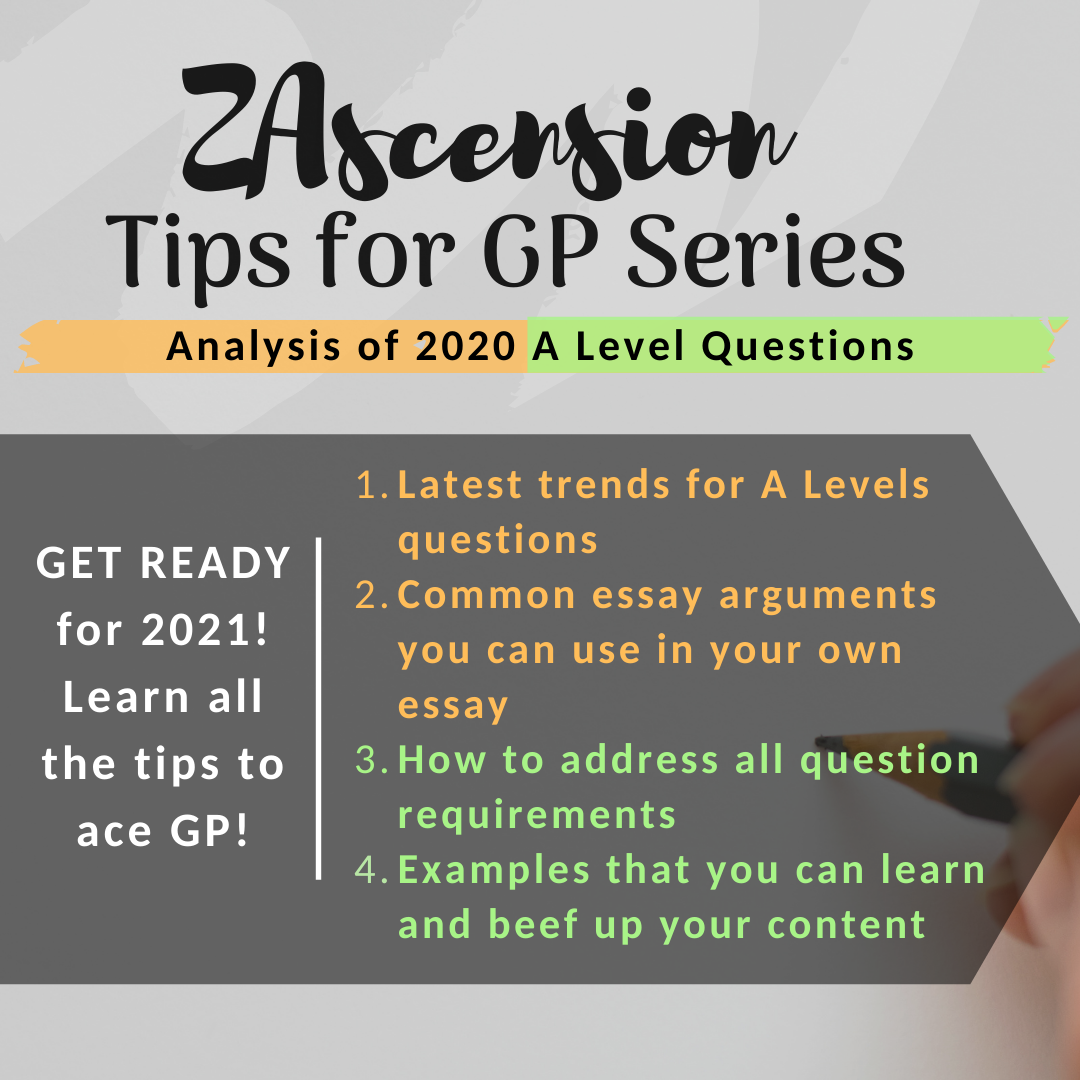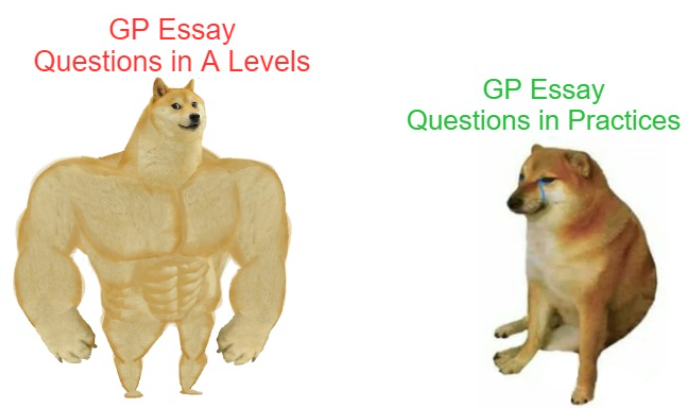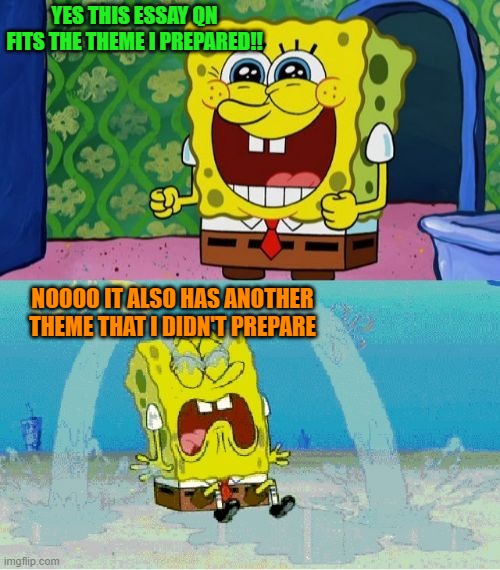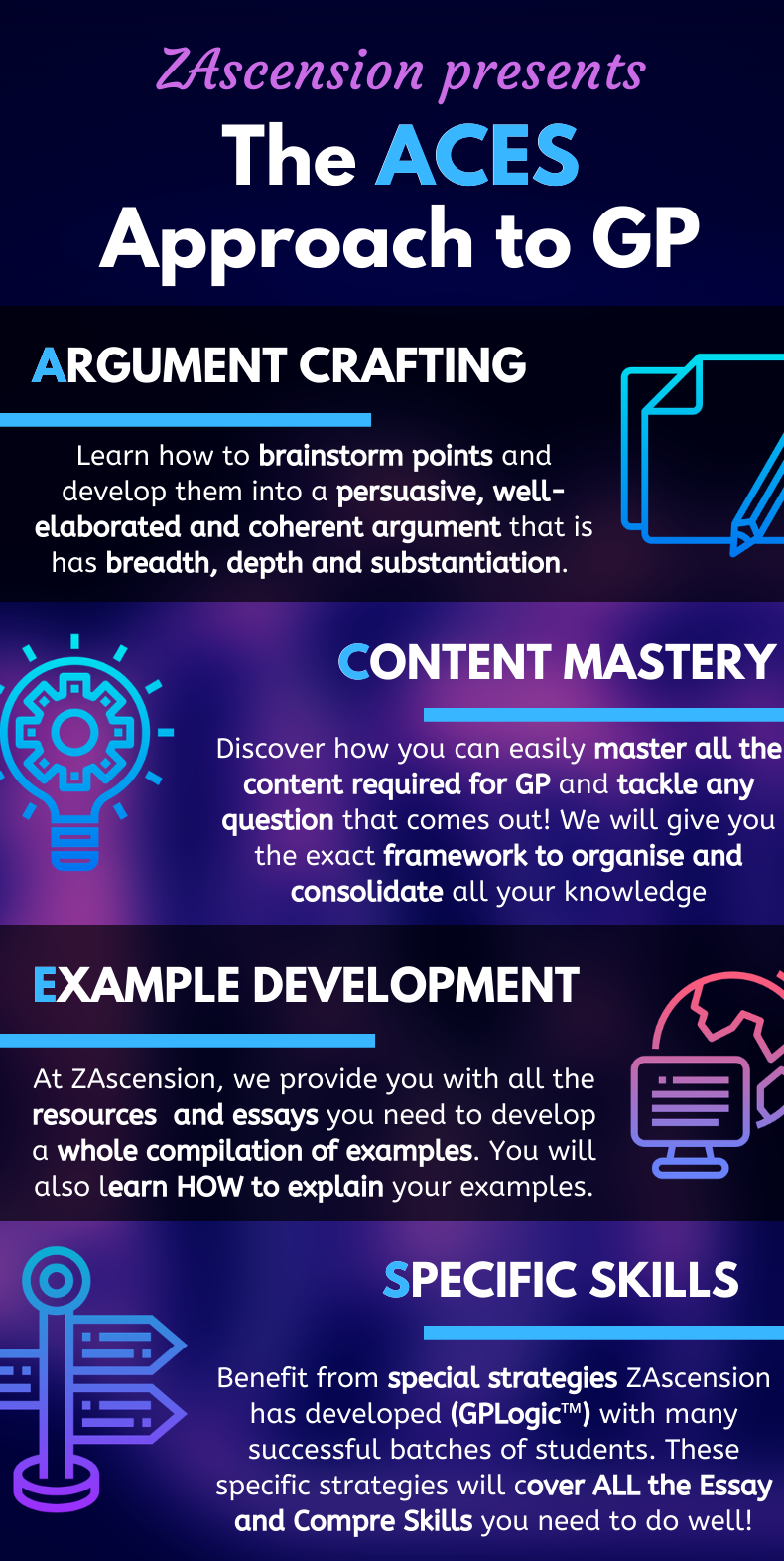GP Essay Questions from 2020 A Levels
If you want more Tips for GP, do also join this free Telegram channel which would share very helpful Tips, FAQs, and update you when articles are updated/posted 😃
Looking for the 2021 A Levels Essay Questions? It’s over here!
1. How reliable are statistics as a guide for planning the future?
2. To what extent is human life in general about the survival of the fittest?
3. ‘Individuals achieve sporting success, not nations’. Discuss.
4. ‘We shape our buildings, but then our buildings shape us.’ To what extent is this true of your society?
5. To what extent can any society claim to be great?
6. Examine the view that the scientist is concerned only with knowledge, not morality.
7. Given greater levels of international cooperation, how necessary is it for countries to engage in the arms trade?
8. Should politicians pursue the popular viewpoint or their own convictions, if they conflict?
9. Is modern technology a benefit or a threat to democracy?
10. ‘An appreciation of music is vital for a fully rounded education.’ How true is this of your society?
11. ‘In a free society, there should be no restrictions on freedom of speech.’ Discuss.
12. How far can prosperity and uncontrolled population growth go hand in hand?
General Insights:
Why do A Levels Essay Questions always seem so much more difficult that Practice/Prelim ones? Is it true that they are more difficult? The good news is they could seem difficult with the niche topics and complex question requirements, but they are actually easy if we analyse them and think about the strategies!
Here is the spread of questions according to Themes (note that there are 13 because Q9 has 2 Themes).
Sci Tech (2): Q6, Q9
Media (1): Q11
Arts (1): Q10
Politics (4): Q5, Q7, Q8, Q9
Individual/Values (1): Q2
General (4): Q1, Q3, Q4, Q12
Standard Questions are important
The key observation is that there are some standard questions (those that recur in prelim questions each year), and it is only a matter of time before they come up for the A Levels. This year the standard questions include: Q6 Sci Tech (Ethics), Q7 Politics (International relations/diplomacy) Q8 Politics (Leadership and popularity), Q10 Arts (Value of Music), Q11 Media (Censorship). These are questions that have repeatedly come up in prelim questions across the years but have not been tested in the A Levels, and this year they finally make an appearance!
So, what we learn is this : it is important to break down each Essay Theme into specific sub-topics and categories to thoroughly go through these different standard questions/sub-topics (this is something we focus heavily on here at ZAscension GP Lessons). It would have been a pity not to have prepared for such sub-topics if we are focusing on that particular Theme. It also makes content a lot more manageable because we start to understand Themes in small parts, rather than just an open-ended scope of knowledge. This would help us prepare adequately for any Theme we want to focus on.
Niche Questions are common curve balls
The other interesting observation is the existence of very niche/unexpected/diverse/broad kinds of questions. These include Q1 Statistics, Q4 Buildings, Q5 Greatness of societies (under the theme of Politics but very niche), Q12 Population (related to environment but only partially). It is unlikely that we have adequately prepared for such questions. This is the current trend of GP A Levels where examiners love to come up with very ingenious questions, so that the exam would be less predictable and formulaic. Memorising content is simply not the way to go, we need to be very flexible with tweaking our content knowledge to suit different questions and that comes form a place of understanding!
If we want to attempt these questions, we need two important skills: Brainstorming Strategies + Question Analysis. We need Brainstorming Strategies to help us come up with organic and novel points for these unprecedented questions and we would need sound Question Analysis to really understand the questions because they may not be in a familiar territory for our content mastery. Without these two, it would not be advisable to attempt these types of questions.
Politics is a popular Theme this year
Politics questions would come out every single year, but this year it is actually unexpectedly common, with 4 questions on this (even though some are not the standard topics). Politics is probably the least popular Theme among students, but moving forward, future batches of students could consider looking into this Theme given its importance.
Skills are important to help us address varied questions requirements
Question requirements are often complex with modifiers (additional requirement)and there could even be more than one modifier.
Q2: Extent + Variables | Q3: Variables | Q4: Extent | Q5: Extent | Absolute | Q6: Absolute + Variables | Q7: Context/Condition | Q8: Context/Condition | Q9: Variables | Q10: Variables | Q11: Absolute | Q12: Variables
Here is a quick summary of the skills needed (CAVE):
Context/Condition = Examples and arguments need to reflect the context and not just ignore it
Absolute = One view needs to express the absolute
Variables = Both variables always have to be addressed together, in each argument/example. We have to remember to always keep a vigilant lookout for the existence of such additional requirements, instead of eagerly jumping into thinking of points!
Extent = Need to show how both views could be valid to a degree
If you want more Tips for GP, do also join this free Telegram channel which would share very helpful Tips, FAQs, and update you when articles are updated/posted 😃
Specific Analysis:
1. How reliable are statistics as a guide for planning the future?
- This question is a general one that is not quite common. It is easy in terms of question requirements because it is straightforward without additional requirements. However, the examples are challenging because you can imagine that we need to have many examples of statistics (statistics that stretch across different fields: healthcare, transport, education, arts, environment, political participation, psychology etc.).
- We need to analyse the value of these statistics, specifically whether they could help us plan for the future. So unless you memorised many statistics, it could be difficult to prove its value.
- Alternative examples could look at case studies of governments or organisations that have tapped into statistics for planning purposes. This would be possible as long as we know what it used for, for e.g. planning the future state of the economy based on current pandemic statistics.
- Here are some possible points. Agree: Gives a good understanding of the existing situation | Demonstrates the track record and trajectory of issues | Helps us predict likely outcomes | Reveal existing problems that could allow for the crafting of future solutions. Disagree: Can often be tweaked and framed in a subjective way | May not properly capture the nuances of situations.
- Finally, it is helpful to think of the context of today’s world being data-driven and using a lot of big data to perform analytics and prediction. This could be a unique perspective to bring into this question.
2. To what extent is human life in general about the survival of the fittest?
- This question is one of my favourites from this year’s paper. It could seem difficult on the first glance because of the adage or concept ‘survival of the fittest’. For such questions, the best approach is to first break down what this concept entails — what does it mean?
- ‘Survival of the fittest’ means that there is competition and those who thrive are those who can win this competition. In other words, two key concepts stand out: competition and success. We can think of the question asking TWE is human life concerned about being better than others?
- This is a standard Individual/Values (a major theme, check out this article to get a sense of the major themes) question. Remember that for such questions, we do not have to limit ourselves to only individuals, we can think about countries and societies.
- Think about the various aspects of human life and assess whether we focus on competition. Think about how we handle global problems, how we pursue technology, how we live our individual lives, how we are educated, how leaders govern societies etc.
- To stand out, it is important that we have a comprehensive scope that really discusses the many colorful and diverse aspects of our human lives, as a collective society and as individuals. Also, to think of points, consider what is the alternative to over emphasising competition. Notice that asking key questions is a very powerful tool to help trigger critical thinking at every step of the way!
- Alternatives could include: focusing on collaboration, celebrating diversity instead of trying to decide who’s the ‘fittest’ and having each individual offer something unique to the table, emphasising introspection and reflexivity (trying to compare to ourselves and focusing on self-improvement rather than beat others), uplifting the marginalised.
3. ‘Individuals achieve sporting success, not nations’. Discuss.
- Sports is not a popular topic but it does come up periodically. The first thing to do in this question is to figure out what the quote actually means. Try rephrasing it to better grasp the intention. What does it mean for nations to achieve sporting success? What does it mean for individuals to achieve sporting success?
- We can think of this in two big branches: reasons and outcomes. This way of breaking down a larger idea into more manageable parts could be a helpful way to brainstorm for points. More specifically, what are the reasons for sporting success (who contributed to it) and who does the success belong to (who benefits from the success).
- Individuals: By their own merit and efforts, with little support from the nation | Sports focusing on the individual sportsmanship and fighting spirit, instead of the larger symbolic ideas of who wins.
- Countries: Steady pipeline of talent from a robust training programme | Attention of sporting success is placed on countries (for e.g. how many overall olympic medals, or how different countries are known for excelling in different sports)
- Having specific athletes and sporting events in mind would definitely be very helpful for brainstorming points.
4. ‘We shape our buildings, but then our buildings shape us.’ To what extent is this true of your society?
- This is a very interesting question that is quite distinct from other past-year/prelim questions. Typically, questions about buildings tend to focus on traditional buildings and culture. But this question increases the scope to look at all kinds of buildings. Again, scope would be key here.
- We need to discuss a variety of buildings and architecture: traditional, modern, artistic, residential, educational, retail, leisure, transport, energy etc. Of course, we have to also remember that this is in the Singapore context.
- The second thing to understand is: what does ‘shapes us’ mean? Interpreting this keyword is very important here to deliver critical arguments. ‘Shapes us’ refers to how it affects our lifestyle habits, our priorities, our emotions, our interactions, our values, our abilities.
- Thinking of examples of buildings could be very helpful here. We can reverse brainstorm our points by first starting with examples. For instance, we can take a simple example of how life in Singapore could be very different in the city and in the heartlands precisely because of the type of buildings there that influence how we behave. Or we could think about our own experiences: how do we feel when we are in a certain location and how is that feeling caused by our surroundings. Thinking about personal experiences could be helpful for brainstorming, but do note that personal anecdotes should not be examples in Essay.
5. To what extent can any society claim to be great?
- This question is very unique. It is not that similar to any of the themes or topics that is commonly discussed. I always share with students how we can contemplate the reasons why a question even exist; that could give us a lot of insight into how we can approach this question. This idea of society being ‘great’ is certainly popularised by Trump’s slogan ‘Make America Great Again’ in his 2016 presidential campaign.
- This question wants to evaluate whether such a slogan/claim can hold. From there, we can tell that the Theme of interest is Politics. When a question is so broad, we must be mindful that we carefully consider the scope. What are the aspects of society that can decide whether it is great or not? What are the criteria? (E.g. tech, education, healthcare, safety, sustainability, inclusivity etc.)
- Take note of the absolute in this question — ‘any’. A useful method is to think about the two views for every question to better understand what is being asked. Agree = Any society can claim to be great. Disagree = Not just any society can claim to be great (not every society). Do take note that it is not asking whether countries SHOULD claim to be great; it’s whether they CAN. An important distinction is: ‘Should’ looks at the merits and drawbacks while ‘can’ thinks about whether it is possible. Remember also that this question is an extent question, so we need to balance both views, how can they both hold true to an extent?
- Agree: Each society has its unique strengths that could make it great and greatness need not be relative | Each society can track greatness by looking at their own progress (greatness could mean that they have overcome many challenges).
- Disagree: Some societies have glaring existing problems that need to be addressed | Some societies have significantly deteriorated from how they were previously (that makes it ironic to claim greatness) | Greatness can be a political slogan that is self-inflated and sensationalised instead of reflecting reality
6. Examine the view that the scientist is concerned only with knowledge, not morality.
- This is an easy question that is very standard. I have been predicting how this question would certainly come out because it is such an important question to ask but has not been discussed in A Levels GP before. Simply put, we need to examine how science interacts with morality and ethics. Fortunately, in this question, we can look at both scientific knowledge and technological inventions since both relate to scientists (some questions force us to only limit our scope to either).
- Take note that there are 2 variables here: Knowledge, Morality. There is also an absolute ‘only’. Again, it is much easier for us to clearly state what the 2 views are before we think about the points. Agree = Scientists are concerned only with knowledge, not morality. Disagree = Scientists are concerned with both. We can see here how important it is to outline the two views because there are many pitfalls.
- Pitfalls include:
- 1) Agree = Scientists are concerned with knowledge, Disagree = Scientists are concerned with morality (the mistake here is separating the variables instead of engaging both in each viewpoint)
- 2) Disagree = Scientists are not concerned with knowledge (knowledge is already taken as a condition in the question, the assertion is focusing on whether it is ‘only’ knowledge, not whether it is knowledge)
- 3) Agree = Scientists SHOULD not be concerned about morality, Disagree = Scientists SHOULD be concerned about both (this is wrong because the questions looks at ‘is’ not ‘should’. In other words, ‘is it happening’, not ‘should it happen’.
- This question is easy because the content is standard. But here we can see that even for standard questions, mastering the skill of analysing questions is extremely important. Analysing incorrectly would lead to the entire focus of the essay being erroneous and it is very easy to make that mistake. This is really why memorising content points without understanding nor skills would not work for the A Levels 🙁
7. Given greater levels of international cooperation, how necessary is it for countries to engage in the arms trade?
- Every year, without fail, there would be a question for Politics. This one is a standard question that looks at international relations, assessing the classic tensions/dilemma of: diplomacy/cooperation vs aggression/confrontation. We need to realise that ‘greater levels of international cooperation’ is a condition, so there is no need to question that.
- The real claim lies in ‘necessary to engage in the arms trade’. Take note that arms trade is not completely the same as confrontation because arms trade looks at the stockpiling and trading of weapons/military technology and it need not lead to conflict.
- In other words, with greater international cooperation, should countries still engage in arms trade? We can question the impact of international cooperation because one view assumes that arms trade is not as necessary given international cooperation. Does international cooperation mean that countries need not pay as much attention to their own defence? The other perspective that is interesting is what value arms trade can hold for countries.
8. Should politicians pursue the popular viewpoint or their own convictions, if they conflict?
- Another Politics question that looks at the domestic domain. Remember that the theme of Politics can include either international relations or domestic governance. This is a very standard question that evaluates what leaders should do. There is always the tension of wanting to pander to the masses (what is popular) and wanting to do what they think is right (their own convictions).
- The condition of ‘if they conflict’ implies that we should not discuss how both of these could be nicely balanced. The question wants us to engage with the difficult dilemma where politicians have to choose either one. So we must discuss the merits of either.
- Popular viewpoint: responsibility of government is to the people (especially in democracies) | voice of the masses on the ground could reflect genuine concerns and needs.
- Own convictions: the government could know better (expertise, experience), what is unpopular could be the right thing to do, people may not always see what is best in the long-term.
9. Is modern technology a benefit or a threat to democracy?
- With regard to content, this is possibly the most difficult question in the paper because it actually extends into 3 unique themes. The 2 main ones are Sci Tech and Politics, but under Sci Tech there is an overlap of Media because social media (a modern tech) has important implications on democracy.
- However, that being said, we must remember that the scope is still about modern tech. We would need to discuss forms of modern tech other than just social media, in order to provide a comprehensive scope. Other forms of modern tech that are relevant to democracy include: surveillance, algorithms and data analytics, virtual reality (it has been used for protests and even terrorism purposes).
- The claim in this question is quite straightforward, such that the two views are easy to figure out. Agree = Tech benefits democracy
- Disagree = Tech threatens democracy. A key focus would be on social media (which has strong overlaps with the 2019 question 4 on social media and politicians).
- Social media can threaten democracy when it is used to spread fake news to bolster populist governments or dictators; social media can help democracy when there is freedom to reflect the voice of the people + when politicians use it to engage with the people.
- As mentioned, consider the role of other forms of modern technology and think about how that would impact democracy. It would be good to have examples that look at various different contexts and countries.
10. ‘An appreciation of music is vital for a fully rounded education.’ How true is this of your society?
- This is a very easy question. At first, it could seem like a cross-theme question that combines Arts and Education, but we need to remember that the value of Arts (music) has a very clear focus on being educational (either about the past, the present world around us, or ourselves through the human condition). This is a perfectly standard Arts question that looks at whether the arts is vital/important. The only thing is the specific focus on music and not any other forms of the arts.
- Fully rounded education means that it needs to be holistic and it needs to extend beyond just knowledge or skills. It needs to look at empathy, values, reflexivity, concern for the community, appreciation of culture and heritage etc. All of these are potential functions of music. Hence, to understand it simply, the question is asking whether music has educational value that is necessary for our holistic development.
- Take note that this question looks at the Singapore context, which means our examples of music need to be entirely related to Singapore. Think about some of the local music we have here: NDP songs, songs in campaigns (like the recent one for COVID, or the one by govsg on diabetes), Xinyao, music in ethnic traditions/celebrations/festivals. We can also discuss some of the international musicals or music performances that are held locally.
11. ‘In a free society, there should be no restrictions on freedom of speech.’ Discuss.
- I am inclined to believe that this is the most popular question of this year. I will share a voting poll later to look at what questions students have the J2 students have selected but based on my experience, this will likely be a top pick. This question is an easy one, which would mean it is necessary to write some unique points to stand out.
- One differentiating point would be students that purely discuss social media, and students who extend the scope to consider other displays of free speech, including: journalism and traditional media, other parts of the internet that is not just social media (content creation), books, films, music. Free speech comes in any place where opinions are expressed publicly and social media is merely one conduit for it (albeit a major one).
- Another differentiating factor is the very important absolute ‘no restrictions’. Regardless of what view we have (agree or disagree), one of the views must express this absolute and argue that there should be NO restrictions on freedom of speech. This is an extreme viewpoint that looks at how there should be zero restrictions and anything expressed can be considered acceptable.
- Another differentiating factor is whether students acknowledge the condition of ‘in a free society’. Examples should only talk about free societies and not certain countries that have intense censorship or despotic dictators that suppress basic freedoms. Note that the purpose of free speech in free societies could vastly differ from that in societies where even basic rights need to be fought for and secured through advocacy or protests. We should also make a nuanced distinction between degrees of freedom (some societies are more liberal than others even though both can be considered to be free societies).
- At the simplest level, the points are arguing for and against restrictions on freedom of speech in a relatively liberal country.
12. How far can prosperity and uncontrolled population growth go hand in hand?
- This question is niche because it has both variables on prosperity and population growth. It has some relation to the theme of Environment but not entirely. Interestingly, Environment did not make an appearance this year or last year. It seems as though Environment questions are no longer as popular despite the growing discourse on sustainability. Perhaps Environment questions would show up again next year.
- Back to this question, it is somewhat related to the environment because uncontrolled population growth can pose some serious environmental problems. If we understand prosperity as a more holistic concept that goes beyond wealth, it would be to important to explain how uncontrolled population growth puts a direct strain on the environment.
- Yet, it is only partially related to the environment because we would need to look at other ideas of prosperity. An essay that does well would one that engages all these different ideas of success for a country, including: the state of the economy, the level of technological development, the literacy/education levels, health standards etc., similar to question 5 above when we think of a society’s ‘greatness’.
- Arguing for how these two variables can go hand in hand would be difficult because it requires us to think how uncontrolled population numbers could actually lead to a good outcome. What can the human capital be leveraged on to achieve? How can the demands of every individual be properly met if there is a scarcity of resources?
_____________________________________________________________________________________________________________________
Yay, congratulations to the J2s of 2020, because you have completed an important milestone. Good job on putting in your best effort for GP. Now it is time to take a short break and refocus your efforts on the remaining papers. Stay motivated and stay confident 😄!!
______________________________________________________________________________________________________________________
If you found this helpful, do check out our new GP Tips & Resources Telegram Channel! Click here to join. This channel is meant to act as a GP companion to share knowledge and help all students, regardless of whether they are a part of ZAscension. Everyday there will be Tips of the Day, Answers to FAQs, Articles and many more. So if you enjoyed this article, this channel will definitely be useful for you 😃
Do share this article and also the Telegram channel with everyone you know who is also studying for GP, let’s share the good stuff so that we may all learn 🙂






